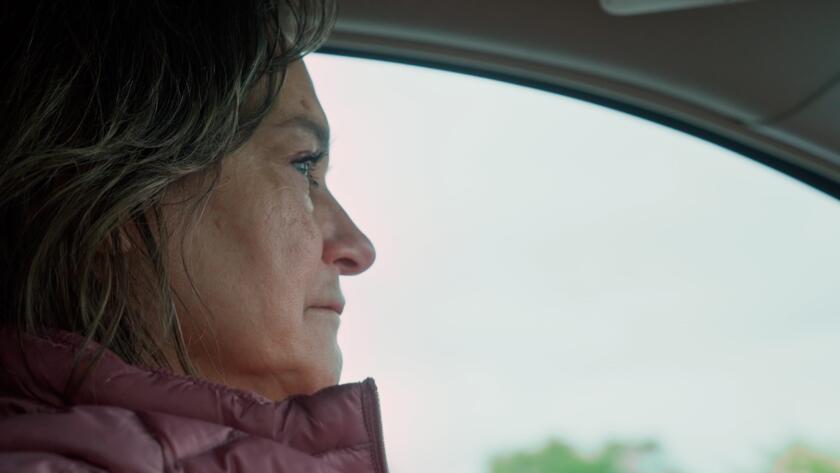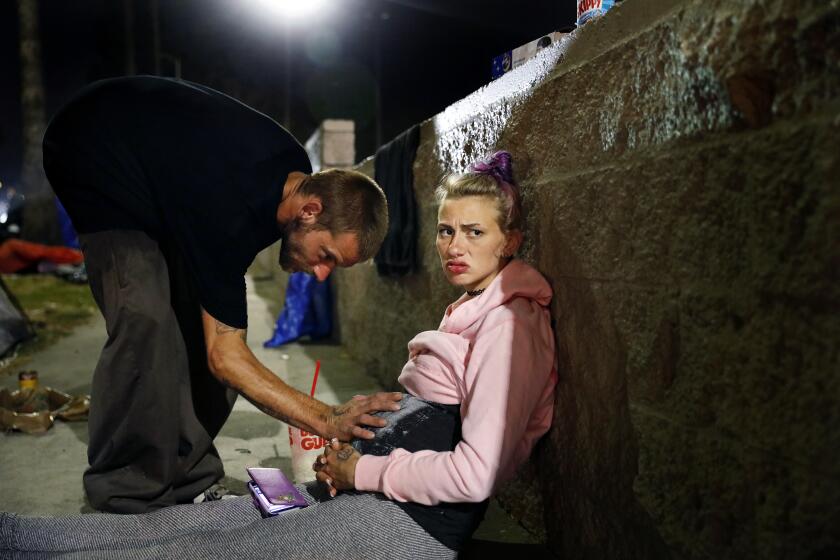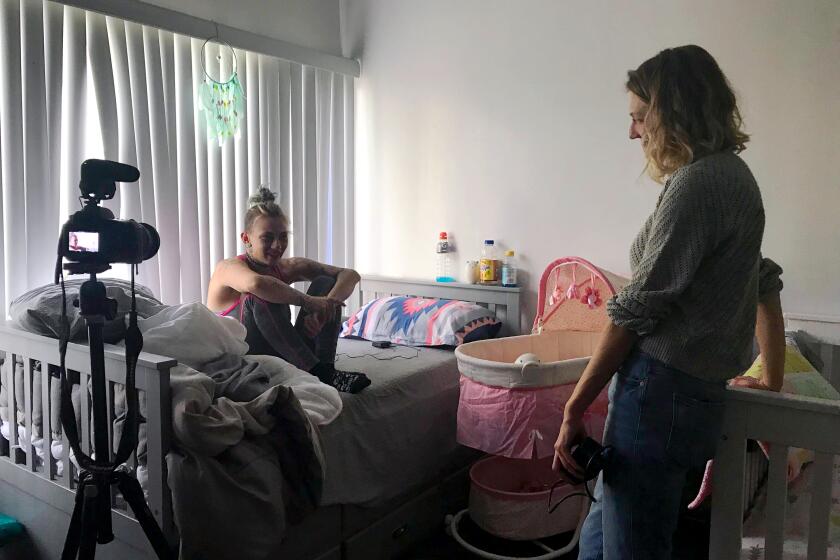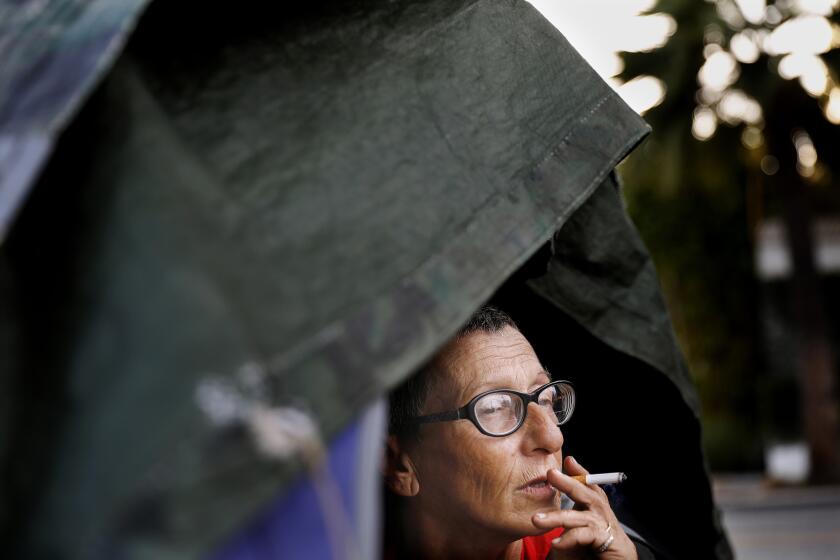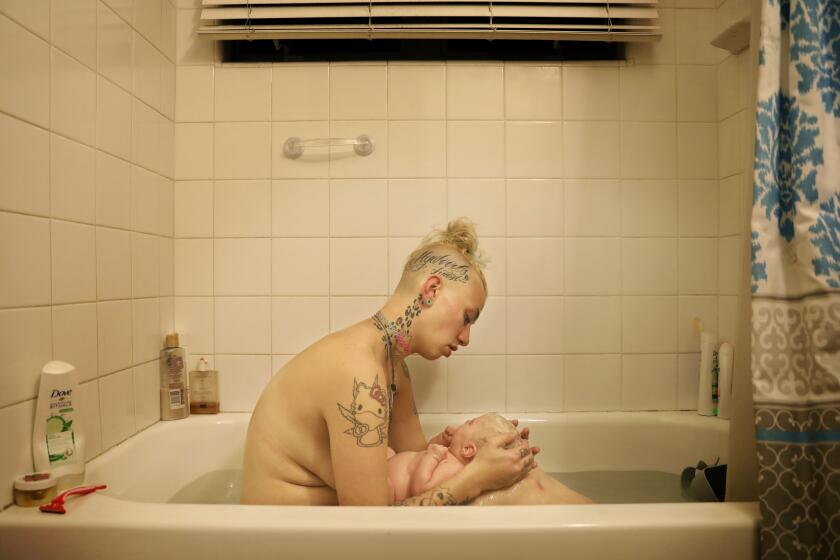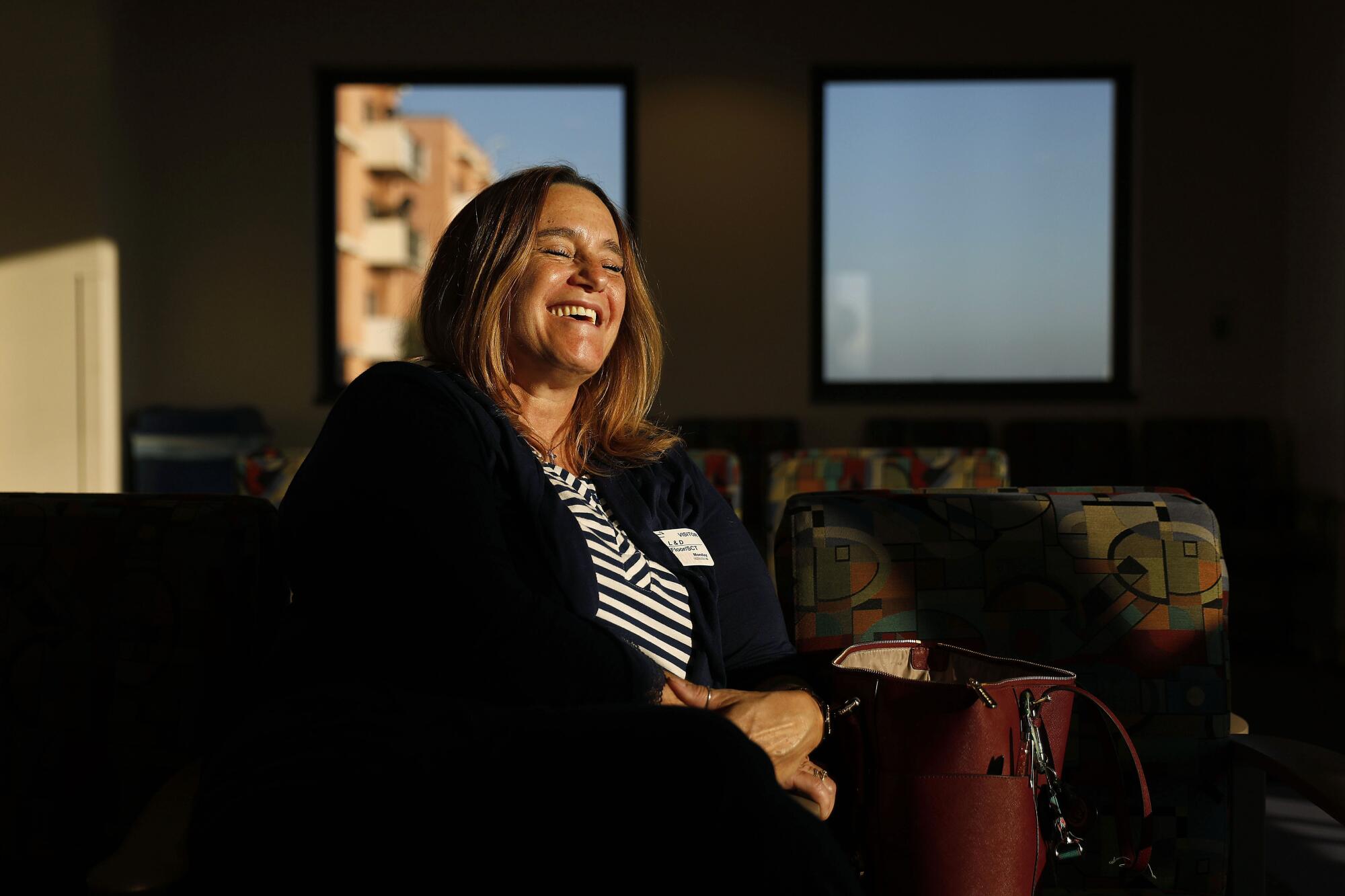
- Share via
After eight months as Mckenzie Trahan’s case manager, Leslie Kerr was leaving. Mckenzie was so dejected that a friend had to trick her into showing up to say goodbye.
Kerr, now 60, saw herself in Mckenzie, who was nearly four decades younger. Both were blunt and sarcastic and found the same goofy things funny: Like Kerr arriving with tuna in her hair after crashing her car in mid-sandwich. When Mckenzie complained about her janky teeth, Kerr popped out her upper dental bridge to make her laugh.
Both had been through addiction, homelessness and losing children to foster care. Deep in her bones, Kerr understood what Mckenzie was going through trying to raise her newborn daughter, Ann, on her own. She babysat Ann on her time off so Mckenzie could train as a forklift operator, and had diapers delivered to Mckenzie’s apartment.
“She could tell me what it was I needed to do, and she could be a bitch about it,” Mckenzie said. “But she had my back. With everything. I f— love Leslie.”
During their time together, Mckenzie did everything the homelessness system asked of her, Kerr said.
It wasn’t enough.
Kerr was saddened but not shocked when Mckenzie lost her housing and parental rights. Mckenzie, who had two older children she conceived in her teens, really wanted a baby this time, Kerr said.
But the expectations on her — to raise a child alone and find housing, day care and a job — were overwhelming.
“They pushed very hard for her to do something that was impossible for her to do,” Kerr said.
In an encampment above the Hollywood Freeway, nothing about Mckenzie Trahan’s future is certain.
For young mothers especially, “It’s going to take a hell of a lot more than putting them in a house, saying you’ll watch their kids and shoving them out the door,” Kerr said.
Reconciliation journey
Kerr left for Spokane in eastern Washington in June 2019 to make amends with her children, her granddaughter and her mother, Sally, for her behavior during her three decades of addiction.
Sally had taken over raising Kerr’s kids, keeping them out of foster care for a time. Kerr’s homecoming could offer Mckenzie a model for reconciling with her own children.
But real life is never that simple. One of Kerr’s five children has cut her off entirely. Another has a drinking problem, and one lost her own child to foster care.
As much as Kerr empathizes with Mckenzie’s pain, she said it’s the children who suffer when they go into foster care: “What the kids go through is far more than you could ever, ever imagine. It’s devastating to them.”
Unlike Kerr, Mckenzie has no home to go back to: Her mother, Cynthia “Mama Cat” Trahan, is homeless.
Despite their similarities, Kerr’s upbringing in 1970s suburban Los Angeles couldn’t have been more different from Mckenzie’s rootless beginnings.
Kerr said her parents were loving but her mom was strict and alcoholism ran in the family. Kerr began using drugs the day she walked out of the house at age 18, starting with cocaine and then switching to meth.
Kerr was sentenced to jail six times for petty theft, meth use and possession, and vehicle violations, court records show. When she was in her 40s, her boyfriend-dealer threw her out, and she was homeless in Arcadia.
Suburban homelessness
At the time, homelessness in suburbia was hidden. There were no tents, and Kerr said she slept alone in an industrial part of town under a jacket, or on a good night, a blanket.
“I would go to a gas station and I would blow-dry my hair with a hand blower and wash my hair ... put makeup on and everything,” Kerr said. “I could make myself look like I wasn’t homeless.”
In 2010, Kerr was facing a three-year prison term in a meth possession and theft case when her public defender persuaded her to accept diversion to an addiction treatment center in Pasadena.
She had been in recovery before and relapsed. This time, she said, the people at the treatment center offered unconditional love, and the rehabilitation took.
We met a world of young homeless people above the 101 Freeway in Hollywood, many who had grown up in foster care and the juvenile detention systems.
Kerr studied the Alcoholics Anonymous book with Talmudic fervor and worked her program hard. After receiving her alcohol and drug counseling license, she worked with teens with substance abuse disorders before joining The People Concern, one of L.A.’s major homeless housing and services agencies. She was staying in a sober-living house and completing her bachelor’s degree when she met Mckenzie.
Kerr said the homelessness system doesn’t give people the time or resources to recover from their experiences. In Mckenzie’s case, she was never offered education or an intensive drug treatment program, though she would have thrived in both, Kerr said.
“You get six months, get them into a home and that’s it,” she said. “There was nothing that I saw when I looked at Mckenzie about recovery that we were addressing or that she was addressing.”
Tod Lipka, president and chief executive of Step Up, a homeless services agency that provided Mckenzie’s psychological therapy and drug counseling, agreed that clients such as Mckenzie with intergenerational homelessness and major trauma need intensive support. But agencies are “challenged by funding streams that attach requirements,” he said.
Earning respect
In Spokane, Kerr rented a two-bedroom apartment, spacious by L.A. standards and neatly kept, with family photos and mementos, including a collection of wall plates with carousels — her mother’s talisman — in relief.
Kerr was unable to get her drug counseling license transferred to Washington state, and ended up working at a home improvement store and a fulfillment warehouse. Soon after her arrival, her mother, Sally, became disabled with arthritis and Parkinson’s disease and asked Kerr to care for her.
Until Sally’s death last year, Kerr was her seven-day-a-week caretaker, performing the most intimate daily tasks — bathing, dressing and helping her use the bathroom — a harsh regimen in sharp contrast to the indulgent way she lived when she was using.
Over the decades of Kerr’s addiction, bitterness had festered between mother and daughter. During an earlier reconciliation attempt, Kerr had her boyfriend come up from L.A. with drugs and fled in the night, leaving only a note behind.
Sally once proposed separating Kerr’s kids and putting them up for adoption so they would have better lives.
Over their long hours together, forgiveness grew on both sides, Kerr said. They critiqued hours of reality “judge” shows together, and Sally related family history that Kerr had missed.
“My mother would have never, ever in a million years thought that I would take care of her. ... I wasn’t responsible,” Kerr said last year. “She has a lot of respect for me.”
When her mother could spare her, Kerr power-walked around the parking lot of an abandoned big-box store and counted her diet points. She returned after dinner each night to her apartment to tend her potted plants, then fell to her knees to pray at her bedside and went to bed.
The next day she’d be up in time to be at her mother’s side by 8 or 8:30 a.m. That left little time for her children, but “the difference is that I’m here. I’m here.”
That meant, of course, that she was no longer with Mckenzie.
Mckenzie “was a very focused young lady. ... If she would have had the right person behind her, she would have gotten there, simple as that,” Kerr said. “I f— love Mckenzie.”
Mckenzie Trahan — or as her scalp tattoo put it, one of “Hollywood’s Finest” — was born into a family that for three generations had been buffeted by domestic violence, mental illness and homelessness, and caught up in child welfare cases. Times staffers Gale Holland, Christina House and Claire Hannah Collins met Mckenzie in 2018, and since then have documented the stories of Mckenzie and two other women — mother, Cat Trahan, and case manager, Leslie Kerr. Follow along on their journey.

More to Read
Sign up for Essential California
The most important California stories and recommendations in your inbox every morning.
You may occasionally receive promotional content from the Los Angeles Times.
